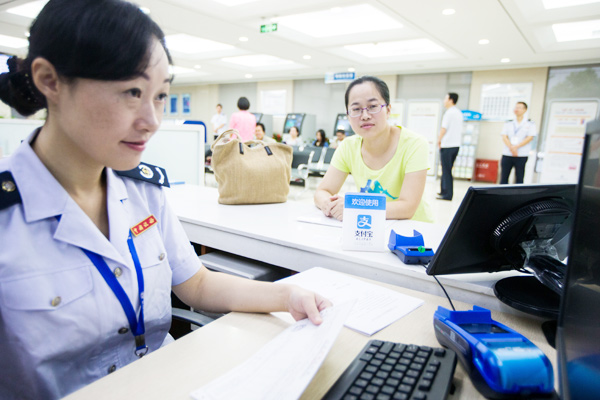Civic services go virtual, cashless

A citizen pays her taxes via Alipay, a mobile payment app developed by Ant Financial Services Group, the financial arm of Alibaba Group Holding Ltd, at the Xihu branch of Hangzhou Taxation Bureau in Zhejiang province, the first in China to adopt mobile payments in civic services. XU KANGPING / FOR CHINA DAILY
Zhejiang province shows how to implement Internet Plus strategy at the ground level.
This story is not about the use of e-wallets, QR codes and bar codes via mobile apps and digital payment tools for coffee, taxi rides, cinema tickets, groceries, sidewalk fast-food and what have you. That's old hat, in China at least.
Instead, this story is about how hundreds of social and other civic services of governments across China, particularly in some cities and regions, are becoming cashless, digital, real-time and internet-enabled.
Traffic fines, marriage pre-registration, remote diagnosis, utility bill payments, income tax filings, doctor appointments ... now need no more than a tap here and a code scan there.
Zhejiang province's capital Hangzhou, home to e-commerce major Alibaba Group Holding Ltd and its mobile payment unit Ant Financial Services Group, is spearheading the drive to make the national government's Internet Plus policy a reality at the ground level.
Hangzhou, Shanghai and Nanjing are among the cities that are utilizing mobile internet, big data and facial recognition technologies for frictionless and secure transactions in civic services, according to the 2016 China Internet Plus and Social Services Index.
In the process, they are showing how going digital could help streamline bureaucratic processes that bedevil government services.
Among the wealthiest provinces in the country, Zhejiang is keen to embrace digital channels so that citizens do not have to run an errand "for no more than once", according to Chen Guangsheng, the government's vice-secretary-general.
"This has become a reality thanks to the establishment of a virtual public payment platform, which effectively covers payments for the government's over 200 services. Residents can transact via the unified online portal," he said.
Zhejiang's virtual services were launched three years ago, and have since handled 15 million transactions worth 450 million yuan, said Chen. He foresees expansion into property transaction fees and health insurance.
Citizens can access the platform via Alipay. Combining location-based services with the payment function, Alipay guides users through its "City Service" that aggregates civic affairs, and redirects them to respective online pages to fill out information and make e-payments.
The self-employed and entrepreneurs find social security fund payments via the mobile app particularly convenient and time-saving. In the past, they had to spend hours and days on the paper work.





 play
play